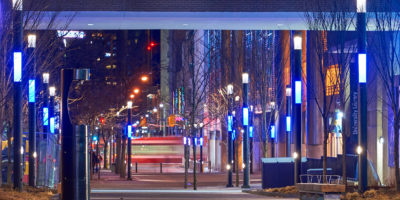By Emily Yearwood
Jessica Zeyl was one of several thousand students who crowded into the intersection of Bay and Yonge streets two years ago. The students were bundled up and carried protest signs reading “Freeze the Fees.” Zeyl, now a fourth-year theatre technical production student at Ryerson remembers how the clerks working in nearby banks stared at the crowd.
She stayed in that intersection with students from campuses across Toronto for several hours, but left after some protesters stormed a CIBC building at the corner of King and Bay streets. She admits she was pretty spooked when riot police arrived on their horses. This was, after all, the first protest she’d ever been to.
“Those guys didn’t crack a smile,” she recalls.
Students spent the night inside the bank until police promised not to press charges if they left the next morning.
One of the things students were protesting then was tuition deregulation.
Now a catch phrase for student activists, deregulation refers to the Ontario government’s 19997 decision to stop regulating tuition fees for certain “professional” postsecondary degree programs. Universities can now hike fees as high as they want for programs whose graduates are likely to earn large salaries, such as engineering and teaching.
A memo from the Ministry of Training, Colleges and Universities sent to every postsecondary institution in Ontario in May, 1998, listed undergraduate engineering and computer science programs, as well as dentistry, pharmacology, law and graduate business degrees as professional programs.
The memo stated deregulation would be implemented during the 1998-99 school year, but unlike many other universities, Ryerson’s board of governors chose to hold off on deregulation—at least for the next two years.
But during a “fireside chat” at Pitman Hall last Tuesday, Ryerson president Claude Lejeunesse told residents that, although an official decision has not been made, if deregulation is implemented next year it will only affect computer science and engineering programs. Some consider deregulation a great temptation for Ryerson’s administration because it would allow the school to recover some of the money lost in provincial funding cuts over the last decade.
But, deregulation would mean administration would have to invade the shallow pockets of students. If trends at other universities aren’t any indication, these pockets may turn from shallow to empty.
Lakehead University raised the annual cost of an engineering degree to $4,412 from $3,950 this year. The University of Toronto hiked the price to $5,838 from $4,416 and Waterloo made a substantial 19 per cent leap to $6,127.
Did the cost of deregulation cause a decline in the number of students taking engineering classes at those schools? Despite the hikes, Lakehead University student union president Brent Evans said it hasn’t hurt the program’s enrolment.
“I guess it hasn’t because it’s engineering [degrees that were deregulated] and those are in pretty high demand, so people are going to keep coming.” Evans said.
Pieriana Filippone, scholarships and awards officer U of T’s engineering program, said she hasn’t seen an increase in the number of students applying for extra funding. “It does happen that we get students who come in here and say they can’t afford to be here, that they can’t pay rent,” she said, but adds those cases are rare.
Sean Voskamp, president of the U of T Engineering Students’ Society, said the higher tuition fees won’t force him to leave school, but it does mean he’ll need a larger OSAP loan. But Voskamp believes deregulation and fee differentiation between programs leads to a fairer education system for students.
“No one likes getting fees raise,” he said. “But you have 36 hours of [engineering] class, whereas arts and science programs have 11-12.”
At Waterloo—consistently rated high in Maclean’s annual university rankings—students are prepared to pay the price for their engineering degrees.
“Although nobody wants to see the tuition go up, it’s better that it’s the engineers rather than other people,” Rob Schmidt, a third-year mechanical engineering student said. “The programs that cost the most [to teach] should cost the most.” He said it’s expensive to keep up with the latest technology.
Lajeunesse said Ryerson risks its reputation if it fails to align its professional program fees with other Ontario universities.
But RyeSAC president Erin George said she is worried all programs at Ryerson will eventually be considered professional, even though only two of the programs listed on the provincial government’s deregulation memo—computer science and engineering—are taught at Ryerson.
“Professional and high demand can be anything,” George said. “If our programs aren’t considered professional, I don’t know what is. Deregulation is the scariest thing to happen to Ryerson. It’s the line in the sand.”
Tobin Armour, a first-year computer science student, paid his tuition with an OSAP loan and help from his mother. “A thousand dollars is a really big deal for us,” Armour said when asked if a $1,000 tuition hike—like the one implemented at U of T this year—would matter to his family.
He said he would probably handle a tuition increase by taking a larger OSAP loan.”I’ll pay it,” he said. “I’m not going anywhere. I love the program here.”
Armour’s roommate Mike Keevil, a first-year engineering student, said he knows fellow classmates who would suffer if tuition increases. “There are others for sure who will feel it, who are strapped for cash,” he said. “But I think they feel it’s worth paying … because of the job they’re getting.”
Neither Armour nor Keevil will be at the Canadian Federation of Students’ Access 2000 protest on Wednesday. “I don’t know enough about it.”
Keevil said he thinks the protest is a good thing, but it’s not for him. “I’m not a protester. That’s not something I would do.”
Zeyl remembers the 1997 protest with fondness, but she also knows how hard it is to convince students to fight deregulation. “It’s really hard to get people fighting for what’s right,” she said.
Thinking back, she recalls the reason why she decided to protest that day. “I really believed that if I didn’t stand up for this cause, then why should I expect anyone else to.”









Leave a Reply